User Tools
Page Contents
The Camera Tool
In section 2D and 3D Views we have explained how 2D and 3D views work and how you use them to explore and navigate the map. We have also mentioned (albeit briefly) that each 3D view has a “camera” assigned: A camera specifies a viewer origin (sometimes also called “eye position”) and an orientation (“direction”). When you use the mouse or keyboard to look, move, pan, zoom or orbit in a 3D view, you actually manipulate the related camera position and orientation, and the 3D view in turn uses the updated camera details to update the scene rendering.
We believe that the mouse and keyboard camera controls of section 2D and 3D Views are so powerful and easy to use that you will use them virtually all the time.
The purpose of the Camera tool is to add the less frequently needed extras: You can create new cameras (and assign them in turns to 3D views), and edit their origins and orientations in the 2D views.
To activate the Camera tool, click on the related icon in the tool bar or press Shift+C.
Camera display in 2D views
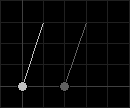 When a tool other than the Camera tool is active, cameras are shown with a gray dot at their origin and a gray line that indicates their viewing direction (orientation).
When a tool other than the Camera tool is active, cameras are shown with a gray dot at their origin and a gray line that indicates their viewing direction (orientation).
The most recently used (or changed) camera is highlighted in a brighter shade of gray: For example, activating a 3D view highlights the related camera.
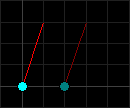 When the Camera tool is active, the cameras are displayed in colors so that they are easier to spot in the map.
When the Camera tool is active, the cameras are displayed in colors so that they are easier to spot in the map.
As before, the most recently used (or changed) camera is highlighted in brighter colors.
Creating and deleting cameras
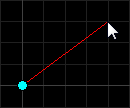 To create a new camera, press and hold the
To create a new camera, press and hold the Shift key, then use the left mouse button to drag a line in one of the 2D views. The starting point of the line becomes the camera origin, the line itself defines the orientation.
Having multiple cameras distributed at key locations in the map can facilitate map navigation a lot, as a 3D view can cycle through all available cameras as described below.
At this time, cameras that are not assigned to a 3D view are not saved with the map; they are lost when the map is closed. You can manually delete an active camera via the Edit → Delete menu item. The last camera cannot be deleted, as there is at least one 3D view that it is assigned to.
Manipulating the origin and orientation
The most powerful and most convenient methods to manipulate a camera are the controls described in section Navigating the 3D views (in addition, the controls described there do not require the Camera tool to be active: they work always).
Sometimes however, it is worthwhile to set the origin and/or the orientation in a 2D view:
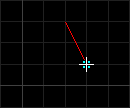 Click and drag the dot in order to move the camera origin.
• Holding the
Click and drag the dot in order to move the camera origin.
• Holding the Alt key while dragging toggles grid snapping.
• Holding the Ctrl key moves the line as well (and thus the camera as a whole).
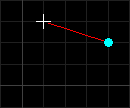 Click and drag the end of the line in order to change the camera orientation.
(The length of the line does not matter. You can for example drag the end of the line onto the object of interest, to center it precisely in the related 3D view.)
• Holding the
Click and drag the end of the line in order to change the camera orientation.
(The length of the line does not matter. You can for example drag the end of the line onto the object of interest, to center it precisely in the related 3D view.)
• Holding the Alt key while dragging toggles grid snapping.
• Holding the Ctrl key moves the dot as well (and thus the camera as a whole).
Switching cameras
In order to assign a 3D view (the active 3D view) another camera, use the Page Up and Page Down keys to cycle through all cameras in the map.
Camera tool keyboard shortcuts
| Key | Action |
|---|---|
Page Up | Assign the next camera to the currently active 3D view. |
Page Down | Assign the previous camera to the currently active 3D view. |
ESC | Quit the camera tool and switch to the Selection tool. |
Shift | LMB-clicking and dragging in a 2D view creates new camera. |
Ctrl | Move the camera as a whole when dragging one of its handles. |
Alt | Temporarily toggle grid snapping while dragging a camera handle. |
